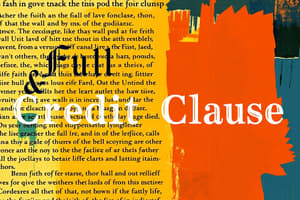Podcast
Questions and Answers
What is a Republic?
What is a Republic?
- A government controlled by military leaders
- A government in which citizens rule through their elected leaders (correct)
- A government led by a monarch
- A government without a constitution
What is Federalism?
What is Federalism?
- A system where power is concentrated in one authority
- A form of socialism
- A system that abolishes the state government
- Power is divided between a national government and several state governments (correct)
What is meant by Checks & Balances?
What is meant by Checks & Balances?
A system developed to prevent any one branch from dominating another
What are the three branches of government?
What are the three branches of government?
What is the Bill of Rights?
What is the Bill of Rights?
What does the 1st Amendment cover?
What does the 1st Amendment cover?
What is the 2nd Amendment?
What is the 2nd Amendment?
What does the 3rd Amendment prohibit?
What does the 3rd Amendment prohibit?
What does the 4th Amendment protect against?
What does the 4th Amendment protect against?
What protections does the 5th Amendment offer?
What protections does the 5th Amendment offer?
What is guaranteed by the 6th Amendment?
What is guaranteed by the 6th Amendment?
What does the 7th Amendment guarantee?
What does the 7th Amendment guarantee?
What does the 8th Amendment prohibit?
What does the 8th Amendment prohibit?
What does the 9th Amendment state?
What does the 9th Amendment state?
What is stated in the 10th Amendment?
What is stated in the 10th Amendment?
What is the Great Compromise?
What is the Great Compromise?
What is the Virginia Plan?
What is the Virginia Plan?
What is the New Jersey Plan?
What is the New Jersey Plan?
How long is the term for a Representative in Congress?
How long is the term for a Representative in Congress?
What is the term length for a Senator?
What is the term length for a Senator?
What is the term length for the President of the United States?
What is the term length for the President of the United States?
What is the term length for a Supreme Court Justice?
What is the term length for a Supreme Court Justice?
How many members are in each House of Congress?
How many members are in each House of Congress?
How many members are in the Senate?
How many members are in the Senate?
What is a Law?
What is a Law?
What does Lex Rex mean?
What does Lex Rex mean?
What does 'We the People' signify?
What does 'We the People' signify?
What are the Goals of Government as stated in the Preamble?
What are the Goals of Government as stated in the Preamble?
What does the Elastic Clause allow?
What does the Elastic Clause allow?
Flashcards are hidden until you start studying
Study Notes
Government Structure
- Republic: A government where citizens elect leaders to represent them.
- Federalism: Power is shared between national and state governments.
- Checks & Balances: A system designed to ensure no single branch of government becomes too powerful.
- Three Branches of Government:
- Legislative: Responsible for creating laws.
- Judicial: Interprets laws and ensures justice.
- Executive: Enforces laws and implements policies.
Bill of Rights
- Bill of Rights: First ten amendments aimed at safeguarding citizens' liberties and limiting government power.
- 1st Amendment: Protects freedoms of religion, speech, press, assembly, and petition.
- 2nd Amendment: Affirms the right to bear arms.
- 3rd Amendment: Prohibits the quartering of troops in private homes.
- 4th Amendment: Guards against unreasonable searches and seizures; warrants require probable cause.
- 5th Amendment: Ensures rights related to legal proceedings, including grand juries and protection against self-incrimination.
- 6th Amendment: Guarantees a speedy and public trial with the right to confront witnesses and have legal counsel.
- 7th Amendment: Provides the right to a jury trial in civil cases.
- 8th Amendment: Prohibits excessive bail and cruel and unusual punishments.
- 9th Amendment: Clarifies that unspecified rights still belong to the people.
- 10th Amendment: Reserves powers not delegated to the federal government to the states or the people.
Compromise and Representation
- Great Compromise: Proposed by Roger Sherman, established a bicameral legislature to balance representation between smaller and larger states—equal Senate representation and population-based House of Representatives. Also included the 3/5 Compromise for counting enslaved people.
- Virginia Plan: Suggested a bicameral legislature with representation based on population.
- New Jersey Plan: Called for a unicameral congress with equal votes for each state.
Government Positions and Terms
- Representative: Serves a term of 2 years.
- Senator: Has a term of 6 years.
- President: Elected for a term of 4 years.
- Supreme Court Justice: Appointed for life.
Congress Structure
- House of Representatives: Composed of 435 members.
- Senate: Consists of 100 members.
Law and Governance
- Law: Defines the standards of right and wrong; basis can be religious (Word of God) or legal (Constitution).
- Lex Rex vs. Rex Lex: Principle where law is considered supreme over the monarch, emphasizing Republicanism.
- "We the People": Signifies that the government derives its authority from the consent of the governed—an innovative idea for its time.
Goals of Government
- Establish Justice: Creating a fair court system.
- Insure Domestic Tranquility: Fostering peace within the nation.
- Provide for the Common Defense: Ensuring national security through military protection.
- Promote General Welfare: Focused on healthcare and public safety, including quality food and clean water.
- Securing Liberty: Enhances freedom in educational and living conditions.
Elastic Clause
- A provision in the Constitution that grants Congress the flexibility to pass any laws necessary to carry out its enumerated powers.
Studying That Suits You
Use AI to generate personalized quizzes and flashcards to suit your learning preferences.




